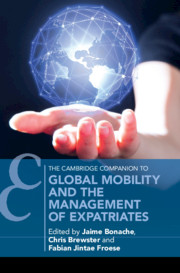13 results
Contents
-
- Book:
- Global Mobility and the Management of Expatriates
- Published online:
- 12 November 2020
- Print publication:
- 26 November 2020, pp v-vi
-
- Chapter
- Export citation
2 - The Recruitment, Selection, and Preparation of Expatriates
- from Part I - The Expatriation Process of Corporate Expatriates
-
-
- Book:
- Global Mobility and the Management of Expatriates
- Published online:
- 12 November 2020
- Print publication:
- 26 November 2020, pp 31-56
-
- Chapter
- Export citation
Part I - The Expatriation Process of Corporate Expatriates
-
- Book:
- Global Mobility and the Management of Expatriates
- Published online:
- 12 November 2020
- Print publication:
- 26 November 2020, pp 29-150
-
- Chapter
- Export citation
1 - Global Mobility
-
-
- Book:
- Global Mobility and the Management of Expatriates
- Published online:
- 12 November 2020
- Print publication:
- 26 November 2020, pp 1-28
-
- Chapter
- Export citation
Part II - Different Types of Expatriates and Stakeholders
-
- Book:
- Global Mobility and the Management of Expatriates
- Published online:
- 12 November 2020
- Print publication:
- 26 November 2020, pp 151-314
-
- Chapter
- Export citation
Figures
-
- Book:
- Global Mobility and the Management of Expatriates
- Published online:
- 12 November 2020
- Print publication:
- 26 November 2020, pp vii-vii
-
- Chapter
- Export citation
Contributors
-
- Book:
- Global Mobility and the Management of Expatriates
- Published online:
- 12 November 2020
- Print publication:
- 26 November 2020, pp ix-xii
-
- Chapter
- Export citation
Tables
-
- Book:
- Global Mobility and the Management of Expatriates
- Published online:
- 12 November 2020
- Print publication:
- 26 November 2020, pp viii-viii
-
- Chapter
- Export citation
Index
-
- Book:
- Global Mobility and the Management of Expatriates
- Published online:
- 12 November 2020
- Print publication:
- 26 November 2020, pp 315-320
-
- Chapter
- Export citation
3 - Expatriate Adjustment
- from Part I - The Expatriation Process of Corporate Expatriates
-
-
- Book:
- Global Mobility and the Management of Expatriates
- Published online:
- 12 November 2020
- Print publication:
- 26 November 2020, pp 57-79
-
- Chapter
- Export citation
7 - Short-term Assignees, International Business Travellers, and International Commuters
- from Part II - Different Types of Expatriates and Stakeholders
-
-
- Book:
- Global Mobility and the Management of Expatriates
- Published online:
- 12 November 2020
- Print publication:
- 26 November 2020, pp 153-180
-
- Chapter
- Export citation
Copyright page
-
- Book:
- Global Mobility and the Management of Expatriates
- Published online:
- 12 November 2020
- Print publication:
- 26 November 2020, pp iv-iv
-
- Chapter
- Export citation

Global Mobility and the Management of Expatriates
-
- Published online:
- 12 November 2020
- Print publication:
- 26 November 2020

